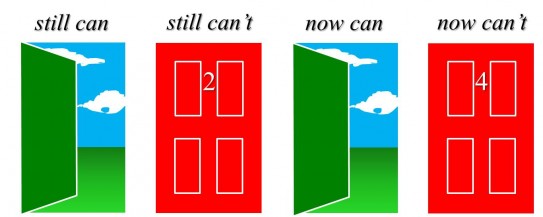Whenever our society is faced with any kind of change, we almost always over-estimate its impact on everything. So how do we keep change in perspective?
Imagine four doors.
The first door (called ‘We Still Can’) has always been open. It represents all the things you were able to do before the change, and can still do after it. A list of such things would be very, very, long.
The second (‘We Still Can’t’) is locked, and always has been. It’s all the things you’ve never been able to do, and never will. (Another long list). Between them, doors one and two represent a massive list of things are have not changed one bit.
The third (‘We Now Can’) once locked, is suddenly wide open. It stands for all the things you could never do which suddenly you can. These are the opportunities we need to grab, now, while the opportunity is still there.
The fourth and final door (‘We Now Can’t’) once open, is now locked. Behind it are the things we need to learn to let go of. Compared to the first two, this list is usually tiny.
Doors 1 and 2 prove that most things haven’t changed at all. Mourn the loss of whatever’s behind Door 4 if you need to, but don’t overdo it because the rest of us are already exploring the opportunities of Door 3.
Why not join us?

Wade
Hey Jason, I love this concept! With issues of cultural change, I like to be guided by Scott & Jaffe’s (1995) 4 Phases of Change Model (http://www.breakoutofthebox.com/Managing%20Change%20at%20Work%20-%20Four%20Stages.pdf). The most difficult transition in this model that people have to make is that of moving from resistance to exploration. The 4 Doors concept is such a simple tool but it achieves this purpose wonderfully. Great post!
Jason
Hey Wade, I cooked this one up in response to a particularly resistant group and was delighted with how well it worked; the first two doors established an accurate perspective for the change and the final two clarified the choice before us. I’ve used it many times since and it’s never let me down, which might be why I just don’t get as worked up over change as some people do. Or maybe I’m just an example of the old axiom: ‘if you can keep your head while everyone else around you is losing theirs, then you clearly haven’t understood what is going on.’